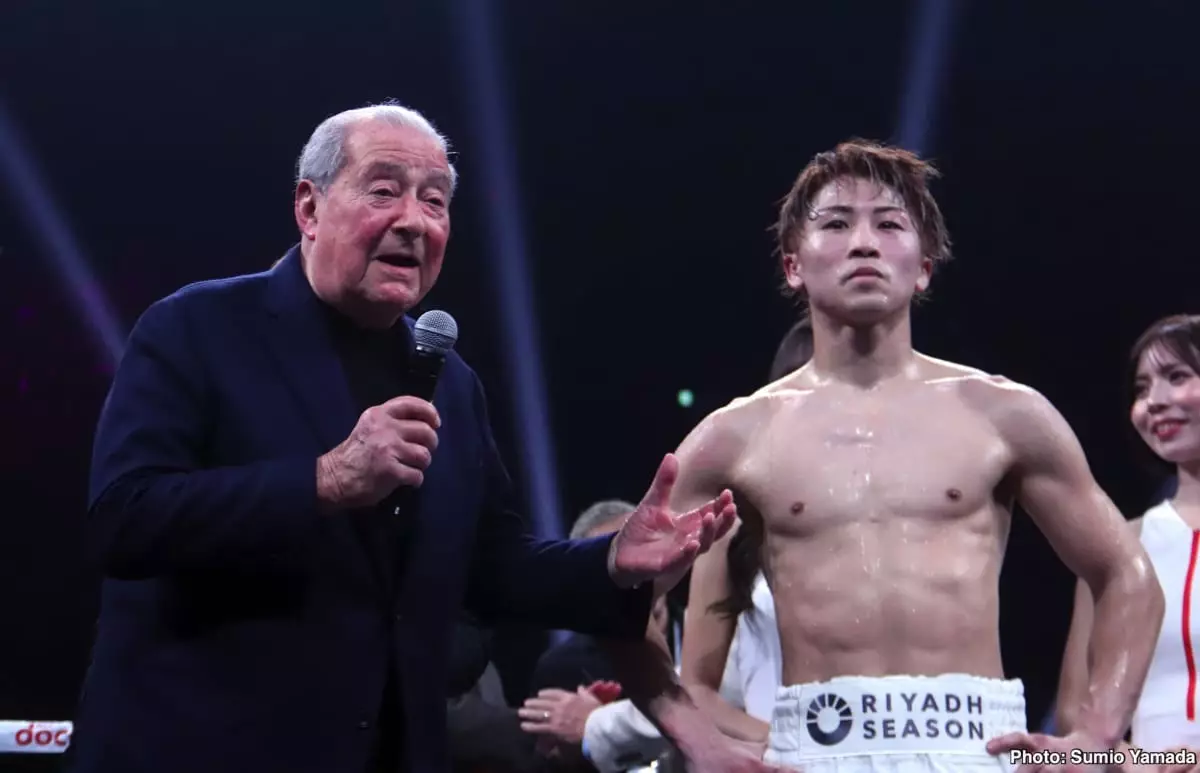Eddie Hearn, a prominent figure in the boxing world and promoter, has ignited a fiery debate regarding the reigning super bantamweight champion Naoya Inoue. In a recent interview, Hearn vocally criticized Inoue, claiming that instead of embracing the challenges of boxing, he has opted for safer, less demanding routes. This piece explores the implications of Hearn’s remarks and the potential consequences for a fighter who many once considered a generational talent.
At the core of Hearn’s critique is a stark assertion that Inoue should be stripped of his WBA title. He has framed this not merely as an isolated incident but as a pattern of behavior, noting that Inoue has unjustly avoided battling his mandatory challenger, Murodjon Akhmadaliev, on three separate occasions. For Hearn, this is not just a matter of poor matchmaking; it’s a significant blemish on the champion’s legacy, diminishing his standing within the sport.
Describing Inoue’s recent fight against a relatively unknown opponent, Ye Joon Kim, as a “horrible mismatch,” Hearn’s disappointment resonates with those who expect champions to rise to the occasion, compete against worthy adversaries, and elevate the sport’s competitive landscape. Hearn’s assertion that Inoue’s resume is subpar paints a disheartening picture; while there might be stars on the record, he argues that the quality of competition leaves much to be desired.
Inoue’s pattern of choosing lower-tier opponents raises important questions about the current state of boxing’s competitive spirit. Fighting well-known fighters such as Nonito Donaire once demonstrated his capacity to endure high-stakes bouts; however, since that fierce encounter, his trajectory has shifted towards less risky options. Hearn provocatively asks followers of boxing why they should accept a champion who consistently opts out of challenging encounters in favor of safety.
The repercussions of such choices extend beyond just Inoue himself. As he continues to select less challenging matches, boxing fans may become disenchanted with a sport that has recently made strides towards more competitive matchups. While there are always discussions about the promotional landscape and fighter economics, the essence of what it means to be a champion is at stake. Inoue’s reluctance to engage in high-risk fights could suggest a disinterest in fortifying his place among the greats.
Hearn further emphasizes the role of regulatory bodies like the WBA and IBF, suggesting they are not doing enough to enforce competitive integrity among fighters. With Inoue reportedly paying for permits to dodge mandatory fights, there appears to be an systemic issue in maintaining accountability within the sport. Hearn’s commentary points to a broader conversation about the responsibilities of boxing organizations to ensure that champions fight worthy challengers, maintaining relevance and credibility in a sport often critiqued for political maneuvering.
Should these bodies continue to allow champions like Inoue the latitude to avoid top contenders, the very structure of boxing risks becoming diluted. Once-beloved champions are made to bear the brunt of criticism, which can ultimately affect their legacies in irreparable ways.
Looking forward, Inoue finds himself at a crossroads. Critics like Hearn argue that without a shift toward more challenging fights, Inoue risks being remembered as a champion who chose convenience over legacy. While it is possible that stripping Inoue of his title may send shockwaves through his career trajectory, the question remains whether it would genuinely prompt a change in his approach to matchmaking.
Regardless of immediate consequences, Hearn’s critical perspective culminates in a call to action for boxing fans and governing bodies alike. A champion must embrace the sport’s unpredictability and commit to facing rivals head-on. An athlete of Inoue’s caliber should not only aspire for titles but should prioritize the essence of competition itself. As the boxing world watches, the path forward for Inoue will be as pivotal as the punches that define his career.


Leave a Reply